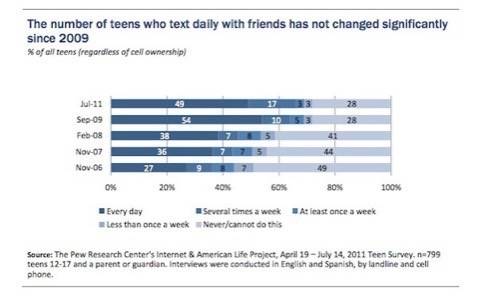The mainstream media always seems to suggest that teens texting is not only annoying, but it’s also a bad thing. Is this fact or media myth?

A new study out yesterday from Pew shows that texting is yet again on the rise, from 50 texts per day in 2009 to 60 texts per day in 2011. According to the survey, girls are not texting. It’s all about boys. Older teenagers (ages 14-17) went from 60 to 100 texts per day. Boys increased number of texts sent per day from 30 in 2009 to 50 in 2011. Pew also notes that black teenagers increased their number of texts sent from 60 to 80 per day. Older girls still text more than boys, sending an average of 100 texts per day in 2011. It’s useful to note that on the whole, 75% of all teenagers text.
The Pew study, for instance, points out in bigger, blue letters that teens’ use of the phone – both cell and landline – has fallen. It does note that the heaviest texters are also the biggest talkers with their friends. So if the whole point is communication – and sometimes connection is better than actual voice-to-voice communication – does it matter that teen texting is on the rise? If anything, it might be a better way for parents and their angsty teens to stay in touch. Sometimes less is more.
Every single technology since Industrial Rev has contributed to dividing up of our lives,” says Dr. Sam Gosling, a professor of psychology at UT-Austin. “Before the Industrial Revolution, we lived in a village where we would work, play, socialize, romance, so all of those things would tend to be with the same group of people, then factories were invented. We had a different life at work than home. Then the social club and the sports club…and as society has become more and more technologically advanced, we’ve been able to increase and segment our lives.”

What does that have to do with texting? For one, it’s one way for teenagers to have total privacy in their communication. Even when a teen, who presumably lives at home or in close proximity to their parents (I realize that I am not taking into account the case of homeless teens, teens who live in shelters, so please know that as you read this story) is looking for some way to privately communicate with their friends.
Texting is far more private than communication on Facebook, for example. Many report problems with their parents lurking on their Facebook walls, worried mothers calling their child because of something the child posted on Facebook, for example. In some ways, the Internet is making our world smaller.
“Then the Internet, social lives – which blurs those lines and brings us all back together, it’s this sort of reversal of postmodern trends,” says Gosling. “All these 19-year-olds in my class have to accept the problem of accepting their parents’ friend requests – but that of course is a very modern concept. The idea that you would have a rich and separate life that they may not know about. Because before, you and they would have been pushing the plow together.”
Texting gives teenagers that sort of autonomy – to have a life separate from their parents. It is akin to email and chat clients, but more personal. It is a portal into a teenagers’ thoughts. Why else would parents be so obsessed with it?
For a moment of humor, check out this Onion video – it’s ironically inaccurate, hilarious and suggests what teens often look like when they’re texting.
Brain-Dead Teen, Only Capable Of Rolling Eyes And Texting, To Be Euthanized
Image via Shutterstock.

















